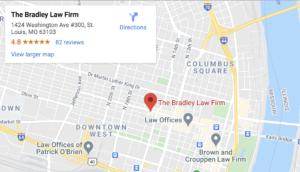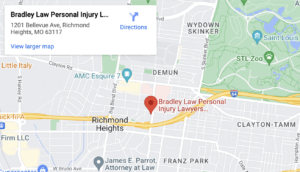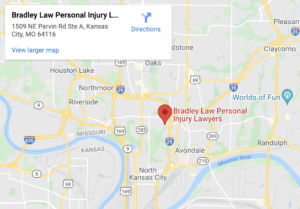
A bad faith claim is when a policyholder files a cause of action against its insurance company for failing to uphold its fiduciary duty. Because the insurance duty owes a fiduciary duty to only its policyholder – and since they are the only two parties to the insurance contract – only the policyholder may file a bad faith insurance claim against his or her own insurance company.
Table of Contents
Types of Bad-Faith Claims
In Missouri, two types of bad faith claims may be brought against insurance companies: first-party and third-party claims. These types of claims will be further discussed in detail below.
First-Party Claims
If an insurance company wrongfully denies or withholds a payout for a claim, the policyholder may have a first-party claim. For example, a person runs a red light and hits your car. You then submit a claim to your insurance company for the damage done to your car by the other driver. Your insurance policy states that the insurance company is obligated to pay for the damage up to the policy limits.
You, as the policyholder, can bring a bad-faith claim for vexatious refusal against your insurance company if it willfully and without reasonable cause refuses to pay for that damage. Your insurance provider will not only have to pay for the amount owed under your policy, but it may also be responsible for additional penalties for its unreasonable refusal to pay.
There is a catch, however. The policyholder must comply with the policy’s terms and conditions in demanding payment for the damages covered under your policy to file a cause of action for vexatious refusal. Additionally, the policyholder must make a demand for payment at least thirty (30) days before filing the lawsuit. Furthermore, the insurance company’s refusal must be without reasonable cause.
Third-Party Claims
If a third party makes a claim against the policyholder, the insurance company still owes a fiduciary duty to that policyholder. Under its fiduciary duty, the insurance company must defend the policyholder against the claim and negotiate and settle the claim in the policyholder’s best interest. If the insurance company refuses or fails to uphold its duty, the policyholder may file a bad faith cause of action.
One of the most common third-party claim scenarios seen is “failure to settle” a claim. This scenario occurs when a policyholder causes an injury to another person or person’s property through an accident. The policyholder’s insurance company will enter into negotiations with the injured party. The insurance company has a duty to put the interests of its policyholder first. This does not mean, however, the insurance company has an obligation to settle the claim.
In a case where the insurance company puts its own interests ahead of the policyholder’s and does not settle a claim within the policy limits, the policyholder may have a bad faith claim.
Why Would Insurance Companies Risk a Bad-Faith Claim?
Insurance companies are businesses, and businesses exist to make money. Normally when bad faith claims are brought against an insurance company, it is because the insurance company is attempting to try to minimize the amount of money it has to pay out on a claim. There are many methods that an insurance carrier may use to avoid paying a policyholder. Below is a list of a few examples:
- Refusing to pay the policyholder in a timely manner.
- Failing to diligently investigate a claim.
- Denying the claim outright.
- Undervaluing the claim.
Indeed, insurance adjusters are often incentivized to minimize the value of their customers’ claims. We’ll now go over these examples in further detail.
Refusing To Pay in a Timely Manner
Unfortunately, insurance companies will sometimes fail to pay out a claim to its policyholder. Normally, the insurance company is trying to get the policyholder to accept a lower amount on their claim. At other times, the insurance company is trying to see if the policyholder will ultimately give up on their claim and go away.
Failing To Diligently Investigate a Claim
Additionally, it is not uncommon for an insurance company to intentionally fail to investigate a policyholder’s claim with due diligence. The insurance company may delay the investigation or fail to investigate altogether. Additionally, the insurance company may fail to gather all pertinent information and speak to witnesses.
Denying a Claim Outright
If an insurance company is denying a policyholder’s claim outright, they will normally use the “fine print” excuse. The insurance company will point to the fine print found within the policyholder’s contract or policy to point to why the policy does not cover the claim. Sometimes, the insurance company might have a legitimate reason for denying a claim. But if not, there could be a valid bad faith claim.
Undervaluing a Claim
Additionally, an insurance company will try to offer a ridiculously low and unreasonable amount to the policyholder to cover the claim. They will also try to do this with a settlement amount.
Contact a Kansas City Personal Injury Attorney
The best advice anyone can give you when it comes to insurance is to review your insurance policy before you sign anything. Know the terms, do your due diligence in finding out what those terms mean, and ask questions. It is important that you understand what you are signing and what you are paying for when it comes to insurance.
If you believe that your insurance company is engaging in bad faith tactics with you, do not hesitate to seek legal advice from an experienced attorney in that field. These claims can be complex, and you will want someone on your side fighting for your rights under your insurance policy.
To learn more about if your insurance company is engaging in bad faith, contact Bradley Law Personal Injury Lawyers to schedule a free consultation at (314) 400-0000.




